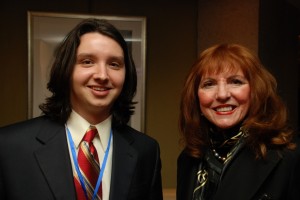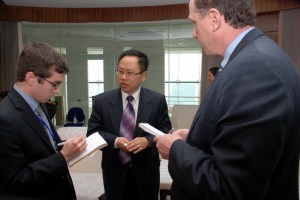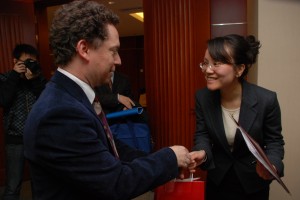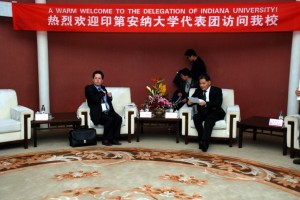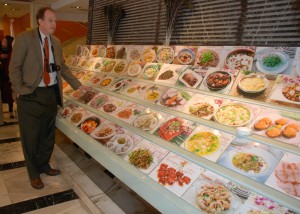Closing thoughts and well wishes to those who follow us
If this is your first visit to our China blog, then I hope that you’ll scroll down further or go to the archive and read more.
Some of my favorite articles to write were those on our first full day in Hangzhou and West Lake, about IU’s 30-year relationship with Zhejiang University, Hangzhou Television, GM in China and the World’s Fastest Train.
There have already been about 12,000 visitors to this blog, including many from China, Taiwan, Russia and many across Europe. Your comments are always welcome.
Making the experience even more enjoyable was the warm bond that was formed among our diverse group of academics, business people and journalists. Since returning to Bloomington, there have been at least two “reunions” – a tasty dinner at Professor Jaffee’s and a presentation to the Bloomington Press Club.
A successful alumna offers some ‘guangxi’
Thanks to Facebook, J T. Forbes, executive director of the IU Alumni Association, has been briefly been sharing with his hundreds 0f friends his experiences from travels this week in China and Korea. Forbes has been traveling there with IU President Michael A. McRobbie.
Naturally, both men have been able to connect with alumni, including some native Hoosiers who are now finding professional success in China.
Among our delegation’s activities was a reception for alumni and friends of the Research Center on Chinese Politics and Business in Shanghai. There I met the engaging Debra Wright, who I’ve continued to correspond with since getting back to Bloomington.
Also known to her friends as “May Day Deb,” Wright works in Nanjing as a business consultant for a Jinling Holdings Ltd., a Chinese government-owned entity that operates or manages nearly 100 hotels and resorts all over China, as well as real estate developments, retail operations and office properties.
They include the No. 1 hotel for business and conferences in Nanjing, which also has hosted world leaders, presidents and royalty from all over the world.
She was the first westerner in the organization’s management team and she graciously has agreed to let me introduce her to you.
Experiences inform research and teaching
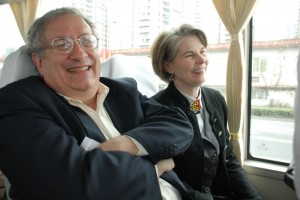
Jeffrey Hart, left, on the bus between visits with Tricia McDougall of the Kelley School of Business
Each member of IU’s delegation of scholars, business people and journalists had their own goals and objectives to accomplish during our visit to China. In this guest column by Jeffrey Hart, professor of political science in IU’s College of Arts and Sciences, he discusses how our experiences at the places we visited will help frame his future research and teaching.
Here is Jeff’s recollection:
“When Scott Kennedy asked me several months ago if I was interested in joining a study group that was traveling to China, I jumped at the chance. My research on the politics of competition in high tech industries suggested that when demand and production shifted away from the industrialized nations to what are now called the emerging nations, so did R&D and innovation.
Reporting from China
If you have been following this blog from the beginning, you may recall that one of the goals for IU’s delegation to China has been to help Hoosiers to better understand China as a people and culture and also how its economic activities are affecting them.
To this aim, two journalists accompanied us: Greg Andrews, managing editor of The Indianapolis Business Journal; and Chris Fyall, a reporter at the Bloomington Herald-Times. Chris and Greg and I joined IU journalism professors Lars Willnat and Emily Metzgar in presenting at a conference at Zhejiang University.
Chris and Greg also were gathering information and talking to many sources throughout the week. Chris filed reports from China, which appeared in the pages of the newspaper. Like me, Greg blogged and worked on a series of articles which came out today in the pages of the IBJ and at the business newsweekly’s web site, http://www.ibj.com.
As you may discern, I am sharing with you links to their fine work. A subscription is needed to access Chris’ articles. He told me today that he’ll have a full wrap-up story in the paper later this week.
An Entrepreneurial Spirit
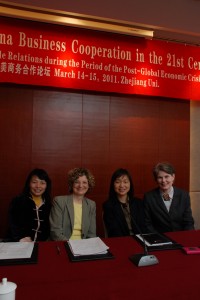
Left to right, entrepreneur Lydia Hu, IU Kelley School associate dean Idalene Kesner, entrepreneur Rachel Gong, and IU Kelley School professor Tricia McDougal
There is a 12-hour time difference between Shanghai and the Midwest, but the connections between Indiana and this part of the world are getting closer.
During our week, we met several successful people developing new businesses in China, and many were Indiana University alumni or those who had been based at Indiana companies for many years.
That trend appears like to continue. The number of students from China at IU Bloomington increased 57 percent between 2009 and 2010. Since 2006, that increase has been more than 300 percent, from 386 to 1,582. China also is a top country of origin for international students at IUPUI.
Among these IU alumni in China is Lydia Hu, who eight years ago graduated from IU’s Kelley School of Business with an MBA degree. Today, she leads own Shanghai-based high-tech company, TrueConvergence Co. Ltd.
“One of the good characteristics of private entrepreneurs in China is that they always start from zero and they’re always very persistent,” said Hu, whose company manages in-room services for guests staying at luxury hotel chains in China such as Hyatt and InterContinental. She formed it little over three years ago.
A Woman in Business
In the United States, the issue of upward mobility of women within corporate ranks continues to be a relevant issue, often called the “glass ceiling.”
In China, we met several women who either successfully ran their own companies or had responsible positions at firms.
According to research by the World Economic Forum, for the first time women and men are entering colleges at the same rate in China. While only 20 percent of leadership roles in China are held by women, this is a much higher rate than many of its Asian neighbors, including Japan.
Among the people we met was Yuanhua Hu, vice general manager and human resources chief inspector at Zhejiang Hengyi Group Co. Ltd., a leading chemical producer for the textiles industry.
Historical Perspective from a IU Professor
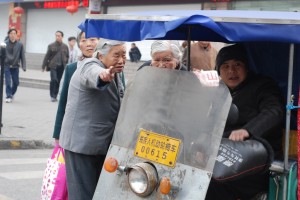
Although there has been an explosion in the number of personal autos and trucks, you'll still find motorized and pedal-powered rickshaws on the roads, along with two-wheeled vehicles
It didn’t take long for Bruce Jaffee, an Indiana University professor who has now visited China three times to see differences in Chinese society and culture.
“During the drive from the airport, we saw high-end apartments … and the place appears to be cleaner than it was 20 years ago,” said Jaffee, IU professor of business economics and public policy and director of the Institute for International Business in the Kelley School of Business.
Other major differences Jaffee immediately noticed were improvements to the country’s road system and the exponential increase in the use of private vehicles. He also noted that many signs and other written forms of communication are commonly also in English.
“Clearly, the people are much more colorful and have much more Western clothing,” he said, adding that it’s a clear change from when most people wore much more understated attire during his initial visit in 1981. Read more…
Shanghai from 863 feet (or 263 meters)
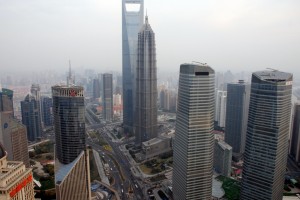
The city's skyline has mushroomed seemingly overnight and is marked by architectual marvels, including the Shanghai World Financial Center (with trapezoidal hole)
Travel writer Rudy Maxa once described Shanghai as “a city being born.” A view from the Shanghai Oriental Pearl Radio & TV Tower – the highest television tower in Asia – provided us with ample evidence for his assessment.
A city with a population approaching 20 million people, Shanghai is being groomed to overtake Hong Kong and is a symbol of the new China’s growth in the 21st Century.
The Rough Guide to Shanghai says that at one point a quarter of the world’s building cranes were in use here.
We took an elevator to the tower’s bi-level sightseeing area, located about 850 feet above the streets of Shanghai. From here we had 360-degree access to the city skyline and surrounding area, including a look down at boat traffic along the Huang Pu River.
Located within a glass ball, we had an opportunity stand on a clear floor (as you see in an accompanying picture) and actually step outside at this height. Read more…
A Diplomatic Visit
As a newspaper reporter and as a media relations professional, I have had the opportunity to interview or simply meet U.S. senators, politicians and presidents, as well as authors and the stars of rock, jazz, folk and blues music.
I met President Barack Obama when he made his memorable visit to Bloomington and IU’s Little 500 in 2008 as a candidate. Others I’ve met include Former Israeli Prime Minister Ehud Barak, California Gov. Jerry Brown, former Joint Chiefs Chairman Colin Powell, U.S. Sen. Ron Paul and millionaire oil man T. Boone Pickens.
Musical icons who I’ve spoken with include the late opera singer Beverly Sills, rocker John Mellencamp, jazz legends Michael Brecker and Chick Corea, members of the great rock band The BoDeans and the late Queen of the Blues Koko Taylor.
My reasons for relating all of this isn’t meant to brag, but to offer context for a remarkable and memorable meeting we had this week with Jin Denshui, governor of Zhejiang Province and a Communist Party secretary. In addition to being an imposing figure, the setting for our well-choreographed visit was impressive.
If You’re Hungry, Don’t Read This
Like fresh fish? I do.
But in Indiana that usually simply means fish that hasn’t been frozen. The “fresh fish” sold in supermarkets across the country still has to be shipped in from the coasts. Or it comes from nearby lakes and fish farms. It’s been filleted and processed.
You don’t typically get a chance to look your meal in the eye before lunch or dinner, but in China you can pick your fish from a water tank and then it is prepared.
On Friday, we enjoyed lunch at Da Lao Guan, a restaurant whose slogan is, “Let delicacies interpret happiness.”
As you walk in the door, you quickly see water tanks of several varieties of fresh fish, shrimps, prawns, razor clams, crabs, lobsters and even turtles. There’s also a rack with fresh vegetables and two enormous placards with pictures of everything on the menu.
Thankfully, someone else is ordering. It would be hard not to say, “I’ll have one of everything.”


